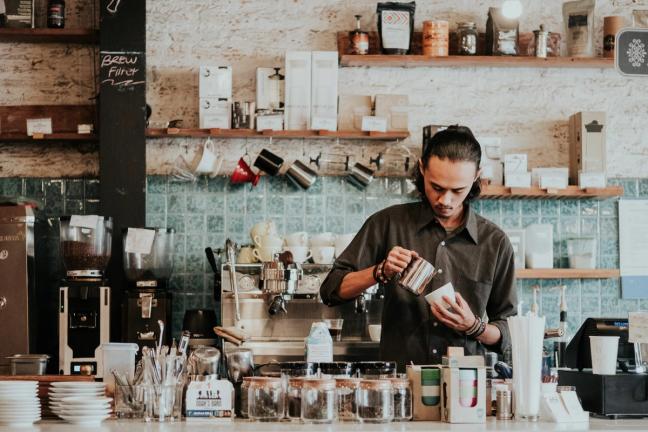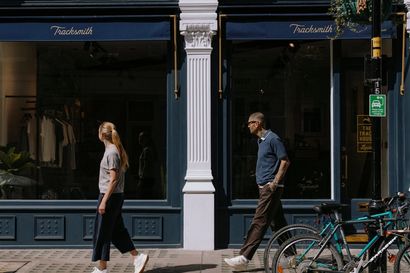Business School: Post-lockdown it can’t be business as usual
Professor Stefan Allesch Taylor on how companies must adapt to a new customer mindset
In his latest Business School column, serial entrepreneur, CBE and Professor of the Practice of Entrepreneurship at King’s College London, Stefan Allesch-Taylor, examines the road to recovery for businesses – and why successful companies will have to adapt to a ‘new normal’.
Business evolves, it always has. In a post-pandemic world the service industry, retail and frankly any ‘person to person’ business, perhaps at least until a vaccine is found, is going to need to go back to its start-up roots, embracing blue sky thinking and innovation. By innovation I don’t mean just the adoption of technology, I mean the re-writing of the rulebook on customer interaction and service.
Dealing with physical distancing solutions is going to be a tough ask of many. For those successful service industry businesses whose pre-pandemic systems hummed along nicely, this is going to be especially hard. They may have to ‘re-invent the wheel’ and their managers are unlikely to have been the creators of the systems – just people who were good at running them. For new entrants into the market, where perhaps the playing field has now been levelled, it could be an interesting opportunity thanks to the entrepreneur mindset. Terrific managers of larger businesses do not always have the appetite for risk associated with rapid change and innovation that an entrepreneur may have.

The challenges, however, go far beyond how these massive sectors of the economy re-engage with their customer base. The few months after the easing of lockdown will be like taking off in an aircraft: we’re moving – but when do businesses get to take off their seat belts? For the vast majority of smaller companies the big question is can they drive trade up quickly enough to cover costs? For many it will be like starting up all over again – but without the initial capital they had the first time round. UK food and beverage businesses, for example, hold an average of just 16 days operating cash at any one time, much of which will be decimated by the time lockdown ends.
Entrepreneurs are natural problem solvers, that’s the job. However the challenge for many may now feel akin to an unstoppable force meeting an immoveable object. New investments will be slow in many sectors and it’s going to make things very difficult for a while. Businesses have to be given time by their stakeholders to rebuild their cash reserves. Entrepreneurs need to be thinking about how to manage expectations and what a likely slow build up of trade from the easing of lockdown onwards may look like.
"Terrific managers of larger businesses do not always have the appetite for risk that an entrepreneur may have."
Businesses will also have to come to terms with the need to be honest with one another. Money is finite; if one can’t pay there is always a domino effect. Entrepreneurs are going to need time: time to re-start, scale and in many cases innovate and change along the way to fit new post-pandemic customer behaviour.
The cash reserves of millions of businesses will be either wiped out or reduced to such a degree that it’s going to require a collective ‘solutions driven’ approach to rebuild markets. The supplier or landlord choosing to work with their creditor is ultimately part of the solution for themselves and the economy. The one who simply issues winding up petitions and threats on the basis of ‘business as usual’ is not.

All service and person-to-person businesses will need to adapt
The toughest part of this seemingly utopian ‘we’re all in this together’ approach is that it requires the one thing sadly often in short supply in the cutthroat world of business: integrity. If people abuse trust, break promises or, perhaps more likely, fail to communicate issues in a timely manner and obfuscate, then that is much more likely to lead to mutually assured destruction.
Research by the Royal Academy of Arts and the Food Foundation in the UK has shown that people don’t want things to go back to the way they were before the pandemic. The overriding desire shown by this research is for a greater sense of ‘community’ and from that we can assume ‘caring’. This will encompass business-to-business relationships as well as society as whole. Businesses need to understand that what they thought were progressive social impact strategies in 2019 are about to go to another level altogether – and be warned the consumer is watching…
Read last month’s Business School column here…
Join the Gentleman’s Journal Clubhouse here.

Become a Gentleman’s Journal Member?
Like the Gentleman’s Journal? Why not join the Clubhouse, a special kind of private club where members receive offers and experiences from hand-picked, premium brands. You will also receive invites to exclusive events, the quarterly print magazine delivered directly to your door and your own membership card.


